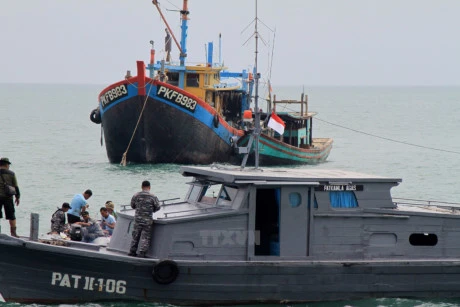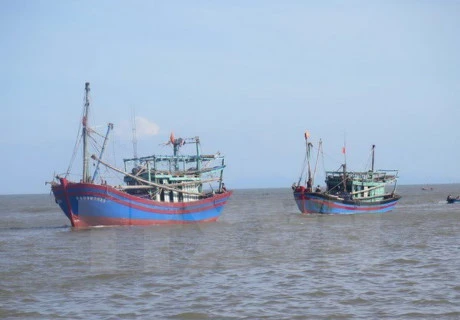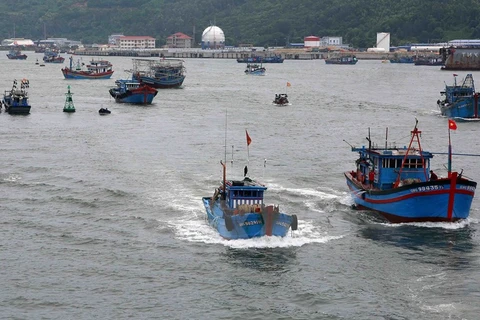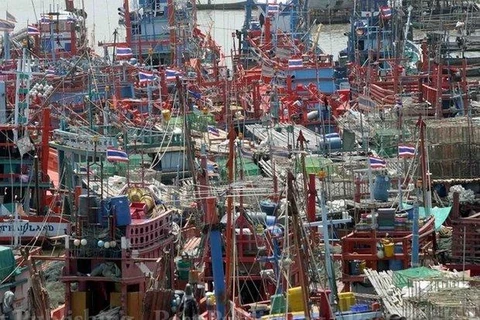Hanoi (VNA) – Vietnam’s export of seafood to the European Union (EU) may fall sharply or even face EU’s “yellow card” if the country cannot meet the EU’s requirements related to illegal, unreported and unregulated (IUU) fishing.
The warning was made at a conference on seafood businesses’ commitment to fight IUU fishing organised by the Vietnam Association of Seafood Exporters and Producers (VASEP) in Ho Chi Minh City on September 25.
If Vietnam is fined with a “yellow card”, all containers of seafood originating from the country will be held to check product origins for 3-4 weeks, said Ngo Viet Hoai, Deputy General Director of the Ba Ria-Vung Tau Seafood Processing and Import Export JSC, whose export volume to the EU accounts for 30 percent of its total export volume.
Even if the containers are allowed to be imported, Vietnamese companies have to pay 600-700 EUR per container in checking fees. But if they are rejected and returned, the transport cost can be 4,000-5,000 EUR per container, he said, adding that the fees will add to product costs and reduce competitiveness of Vietnamese seafood in the EU market.
Nguyen Hoai Nam, VASEP Vice Secretary General, also noted that if a country is fined with a “yellow card”, its name will be publicised on the EU’s official websites and magazines, which will ruin the image and prestige of the country’s seafood sector.
Moreover, other markets such as the US may apply stricter regulations for Vietnamese products, Nam added.
VASEP Vice President Nguyen Thi Thu Sac said that Vietnam’s seafood sector still has time to meet IUU-related regulations.
However, it needs the involvement of the State in adjusting policies and legal mechanisms to well control fishing.
Deputy Minister of Agriculture and Rural Development Vu Van Tam affirmed that Vietnam does not tolerate any violations of other countries’ waters and will punish violated fishing vessels strictly.
All fishing vessels will be installed with monitoring devices in the coming time, while the ministry is considering the signing of cooperation agreements with other countries to ensure legal fishing along with the establishment of a hotline to prevent illegal fishing, Tam added.
At the conference, VASEP urged its members to participate in the fight against IUU fishing. As a result, over 50 businesses committed to buying only seafood caught legally. The list of those businesses is published and regularly updated on VASEP’s portal at www.vasep.com.vn.
Vietnam earns around 1.9-2.2 billion USD per year from exporting seafood, with the EU accounting for 16-17 percent of the total, or 350-400 million USD.
EU played a leading role in the global fight against IUU fishing. The IUU regulation came into effect of October 1, 2010, aiming to ensure that only seafood products certified by the national authorised body or exporting country are imported to or exported from EU.
The list of IUU fishing vessels will be regularly updated, which are defined by the Regional Fisheries Management Organisations (RFMOs).
According to Deputy Head of the Directorate of Fisheries’ Technology Science and International Cooperation Department Nguyen Thi Trang Nhung, 24 countries and territories had received penalty cards under the IUU regulation, including countries and territories with modern fishing fleets, of which 13 nations had their penalty cards withdrawn thanks to improved management systems, including Ghana, Guinea, Panama and Papua New Guinea, as well as the Philippines, the Republic of Korea and Sri Lanka.
Of the remainder, three nations were given red cards - Cambodia, Conmoros, and Saint Vincent and Grenadines - and eight nations and territories were given yellow cards, including Siera Leone, Taiwan, Thailand, Trinidad and Tobago, and Tuvalu.-VNA
The warning was made at a conference on seafood businesses’ commitment to fight IUU fishing organised by the Vietnam Association of Seafood Exporters and Producers (VASEP) in Ho Chi Minh City on September 25.
If Vietnam is fined with a “yellow card”, all containers of seafood originating from the country will be held to check product origins for 3-4 weeks, said Ngo Viet Hoai, Deputy General Director of the Ba Ria-Vung Tau Seafood Processing and Import Export JSC, whose export volume to the EU accounts for 30 percent of its total export volume.
Even if the containers are allowed to be imported, Vietnamese companies have to pay 600-700 EUR per container in checking fees. But if they are rejected and returned, the transport cost can be 4,000-5,000 EUR per container, he said, adding that the fees will add to product costs and reduce competitiveness of Vietnamese seafood in the EU market.
Nguyen Hoai Nam, VASEP Vice Secretary General, also noted that if a country is fined with a “yellow card”, its name will be publicised on the EU’s official websites and magazines, which will ruin the image and prestige of the country’s seafood sector.
Moreover, other markets such as the US may apply stricter regulations for Vietnamese products, Nam added.
VASEP Vice President Nguyen Thi Thu Sac said that Vietnam’s seafood sector still has time to meet IUU-related regulations.
However, it needs the involvement of the State in adjusting policies and legal mechanisms to well control fishing.
Deputy Minister of Agriculture and Rural Development Vu Van Tam affirmed that Vietnam does not tolerate any violations of other countries’ waters and will punish violated fishing vessels strictly.
All fishing vessels will be installed with monitoring devices in the coming time, while the ministry is considering the signing of cooperation agreements with other countries to ensure legal fishing along with the establishment of a hotline to prevent illegal fishing, Tam added.
At the conference, VASEP urged its members to participate in the fight against IUU fishing. As a result, over 50 businesses committed to buying only seafood caught legally. The list of those businesses is published and regularly updated on VASEP’s portal at www.vasep.com.vn.
Vietnam earns around 1.9-2.2 billion USD per year from exporting seafood, with the EU accounting for 16-17 percent of the total, or 350-400 million USD.
EU played a leading role in the global fight against IUU fishing. The IUU regulation came into effect of October 1, 2010, aiming to ensure that only seafood products certified by the national authorised body or exporting country are imported to or exported from EU.
The list of IUU fishing vessels will be regularly updated, which are defined by the Regional Fisheries Management Organisations (RFMOs).
According to Deputy Head of the Directorate of Fisheries’ Technology Science and International Cooperation Department Nguyen Thi Trang Nhung, 24 countries and territories had received penalty cards under the IUU regulation, including countries and territories with modern fishing fleets, of which 13 nations had their penalty cards withdrawn thanks to improved management systems, including Ghana, Guinea, Panama and Papua New Guinea, as well as the Philippines, the Republic of Korea and Sri Lanka.
Of the remainder, three nations were given red cards - Cambodia, Conmoros, and Saint Vincent and Grenadines - and eight nations and territories were given yellow cards, including Siera Leone, Taiwan, Thailand, Trinidad and Tobago, and Tuvalu.-VNA
VNA
























